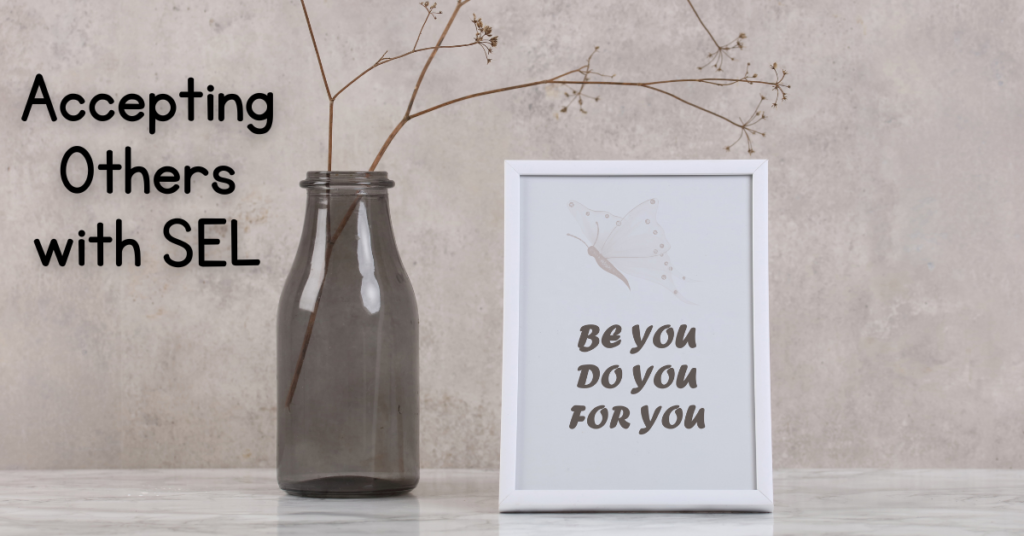Have you ever had someone that you really did NOT like? For some reason, their personality just irked you and pushed you and maybe made you uncomfortable or annoyed? You know the type: the woman who seems to nit-pick or judge everything you do as a parent and make you not feel good enough. Or the man who is rude and impatient to everyone and seems like he’s holding his head up a little higher just so he can look down his nose at you. This post is about accepting others with SEL; accepting them for who they are, even if they’re not who you want them to be.
A Quick SEL Refresher
Social and emotional learning is about teaching our children how to think, things to consider, and questions to ask, then allowing them to think for themselves. It refers to self-awareness, self-management, social awareness, relationship skills, and responsible decision-making. Pretty much, each of these areas will help your child succeed in school, life, and work… and if we’re truly being honest here, these topics will help each of us parents succeed too.
Think of the last time you spent time with other adults you didn’t know. Did you speak and act differently than you do with people you do know? Was there an adjustment period and then you got comfortable in the room, or maybe it remained uncomfortable throughout? Did you notice one man or woman who just seemed to radiate a feeling of acceptance, warmth, or comfort and make everyone else feel like they belonged?
Now think about your kids in a similar situation with kids they don’t know. Would they be comfortable or uncomfortable? Would they need an adjustment period, or would they be the one making everyone else feel welcome and accepting others as they are.

A Personal Story about Accepting Others
Recently I had a call with Korbalagae Kuawogai of Teach My Kinder, and I shared about my last job before I became a mom. I was working as an administrative assistant at a non-profit agency that helped people of all ages with developmental disabilities. For the purposes of this story, this meant that I was in the office whenever things were delivered and I often had to schedule pick ups so I dealt with the delivery drivers. Most of them didn’t bother stopping by long enough for me to learn their names, but there was one I knew by name and we’ll call him Eddie.
For lack of a better word, Eddie was a jerk. You could tell that he thought he knew better than other people and that he was holding back his annoyance, but often let it show. He had been reported for things by the agency so he had a chip on his shoulder when it came to many of the staff there. But for some reason, he and I got along. We got along well enough that I had his cell phone number to arrange for pickups personally or to get an idea of when he’d show up if someone wanted to send stuff when he stopped by.
Although I say “for some reason,” I know what the reason is. I accepted him as he was. I didn’t expect that someday he’d suddenly act differently, and I recognized that he was just 100% being himself, even if that was being a jerk. But I also took the time to get to know him. I knew about his family, and his long hours. I knew that he was respectful of the participants at the agency and was careful not to be rude to them without provocation.
Why is This Important?
SEL teaches us that it’s okay to be you, however you are, and that we can change ourselves, but we shouldn’t expect others to change themselves. If we really get down to it, a “jerk” hasn’t mastered relationship skills. They may have self-awareness, but they lack some self-management and social awareness. We can work on each of these areas with our children, but, just like any other subject, it’s up to them what they learn and retain long term.
It’s up to us to accept others and try not to judge them… even when it feels like they’re judging us. We need to abstain from throwing that first stone and turn the other cheek.

More Examples
Have You ever heard the phrase “bedside manner?” It’s used to describe doctors and nurses in the hospital and how they treat patients when they’re beside their hospital bed. You always want a doctor with good bedside manner: a doctor who is able to make you feel comfortable and at ease. But what if there’s a doctor that makes you feel uncomfortable and stupid but she or he knows their stuff and is better than others at diagnosing or surgery. Which would you prefer?
A combination of them both, right? Drs. Gregory House and Preston Burke were both brilliant, but they lacked bedside manner. I’ve personally had doctors lacking bedside manner and it can be tough… unless you accept them. The neurologist who barely looked at me during appointments (for migraines) – I could’ve hated him or switched doctors, but he knew what he was doing, and I found it amusing that I could see that he took off his shoes and moved his feet around under the desk. This reinforced that he was human and not purposefully being rude, so I accepted him.
Accepting Others with SEL
It can be especially hard to accept others if the jerk or rude person is a member of our family, or ::gulp:: our child. Luckily, as homeschoolers, we can focus on SEL and try to help our children learn and grow as people. BUT it is imperative that we show them acceptance and model positive self-awareness and relationship skills.
The roots of positive, well-adjusted kids and adults are nurtured in the home so they can flourish in the world. So are the roots of the jerks of the world. Who would you rather raise?

Disclosure: As an Amazon Associate I earn from qualifying purchases. This post may include affiliate links which means I may earn commissions for purchases made while using my link.




